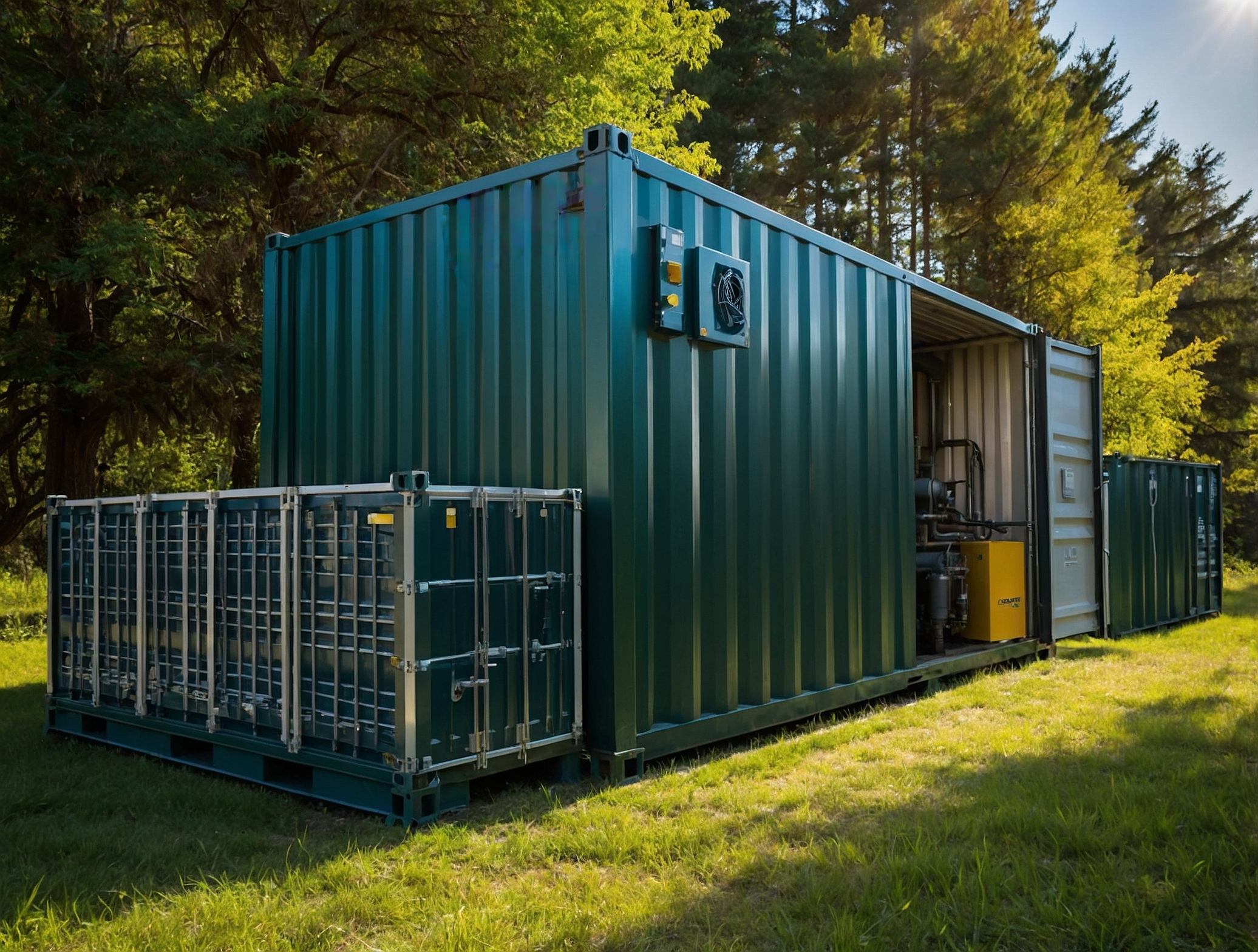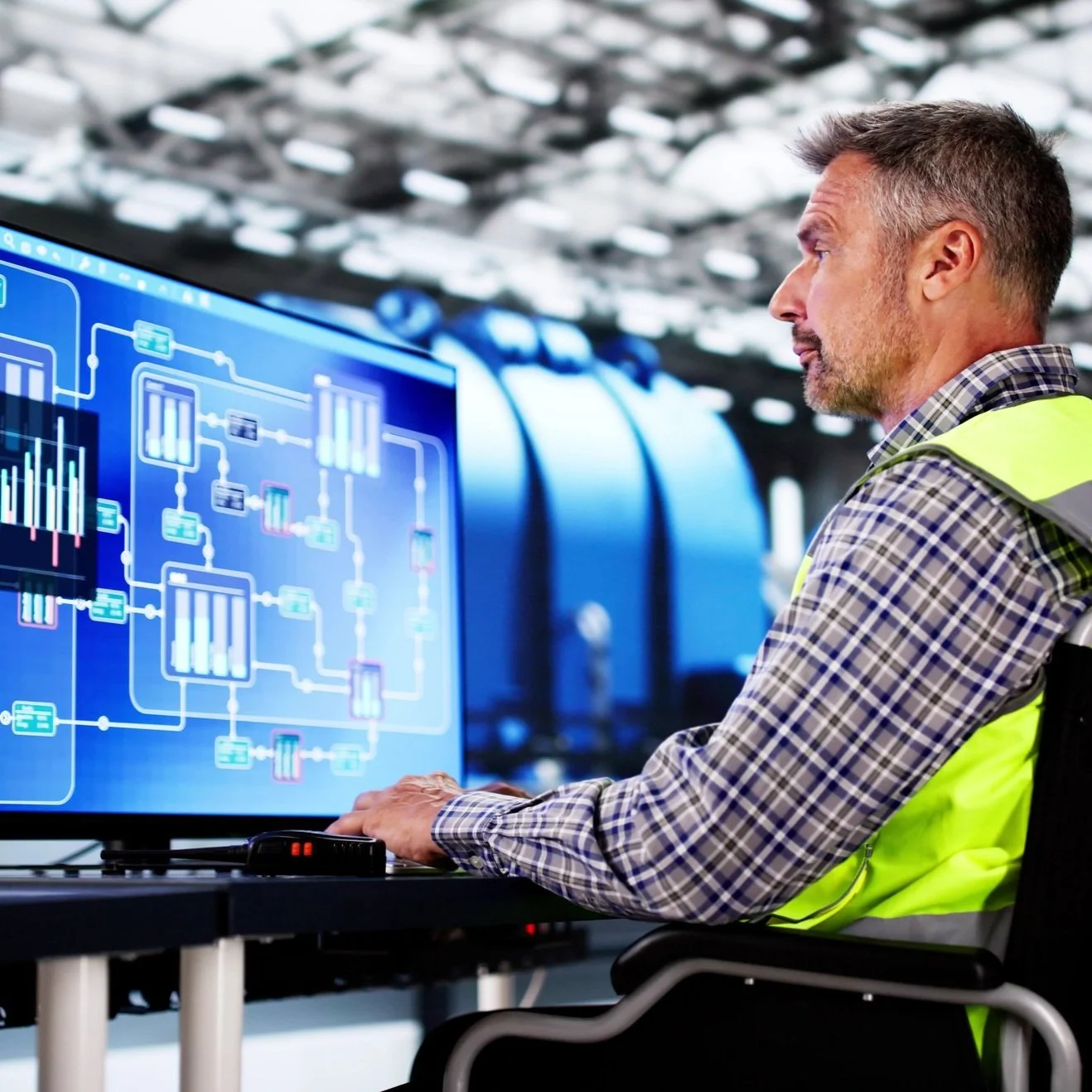
We convert biomass into renewable energy and sequester carbon for over 1,000 years, fostering a cleaner, greener future.
Our Solution
Containerized Design
Our systems are designed to fit within standard shipping containers, enabling easy transport and deployment. This modular approach allows for rapid setup and relocation, making our technology ideal for diverse applications, including remote areas and industries with fluctuating energy demands.
Multi-Output Capability
Our systems produce high-quality syngas, biochar, and carbon credits, providing multiple revenue streams. Syngas can be used for energy generation or industrial processes, while biochar offers value as a soil amendment and carbon sink. This versatility ensures optimal utilization of your biomass resources.
Scalable Solutions
From 30kW to 500kW, our gasification systems are tailored to meet the energy and production requirements of businesses of all sizes. Multiple units can be combined to scale output, offering flexibility and cost-effectiveness as your energy demands grow.
Advanced Telematics and Automation
Equipped with state-of-the-art monitoring, control, and analytics features, our systems enable remote access and real-time performance tracking. This reduces operational costs, enhances reliability, and ensures peak efficiency with minimal manual intervention.
Carbon2H’s biomass gasification systems offer containerized mobility, scalable energy solutions, multi-output value generation, and advanced automation for seamless, sustainable, and efficient operations.
Specifications
Energy
Our smallest 30 kW system fits into a shipping container for mobility. For larger needs, we offer systems up to 500 kW, which are stationary.
Feeding Material
Raw materials like straw, rice husks, cotton stalks, and wood chips and branches can be used with a moisture content of less than 20%.
Pricing
We can deliver customized solutions depending on your needs. Please reach out to get a quote.
Output
Depending on your needs, you can choose to output syngas, hydrogen or, in combination with a generator, create your own electricity.
Certification
Our CE-certified gasifiers meet the highest standards of safety, health, and environmental protection, ensuring compliance with European regulations and guaranteeing quality and reliability.
Mobility
Shipping containers enhance our biomass gasification systems' mobility, enabling easy transport, rapid deployment, and scalable energy solutions.
Biomass Decarbonization
Our biomass gasifiers efficiently convert organic materials into syngas while capturing significant amounts of carbon dioxide (CO₂). During the gasification process, biomass such as wood chips and agricultural residues are heated in a controlled environment, producing syngas and biochar. This biochar captures CO₂ for more than 1,000 years, providing a stable form of carbon sequestration.
Warranty
We believe in our products and therefore grant a warranty of 1 year. You can book additional maintenance depending on your needs.
Industry Applications
Biomass gasifiers provide sustainable energy solutions across various industries. In agriculture, they convert crop residues into syngas, offering farms renewable energy and waste reduction. Manufacturing sectors use gasifiers to power operations, lowering reliance on fossil fuels and reducing carbon footprints. Waste management benefits by transforming organic waste into energy, promoting circular economy practices.
“Portable power, sustainable future—biomass in containers unleashes the energy of tomorrow.”
— Carbon2H
FAQs
-
Biomass decarbonization can support a wide range of industries by providing sustainable energy solutions and reducing carbon footprints. Key industries that benefit include:
Agriculture: Converts crop residues and agricultural waste into renewable energy and biochar, enhancing soil health and reducing waste.
Manufacturing: Provides a renewable energy source for industrial operations, reducing reliance on fossil fuels and lowering emissions.
Waste Management: Transforms organic waste into energy, promoting circular economy practices and reducing landfill use.
Energy Production: Offers a renewable and carbon-negative alternative for electricity generation and heating.
Construction: Uses biochar in building materials, creating long-term carbon sinks and enhancing material properties.
Forestry: Utilizes forest residues and wood waste for energy production, supporting sustainable forest management.
Remote and Off-Grid Communities: Provides reliable, clean energy in areas without access to conventional power grids.
Cooking Stoves: Provides a clean-burning fuel for cooking stoves, reducing indoor air pollution and reliance on traditional fuels, thereby improving health and reducing deforestation.
These applications demonstrate how biomass decarbonization contributes to energy efficiency, sustainability, and environmental stewardship across diverse sectors.
-
Syngas produced from biomass gasification is a versatile and valuable fuel that can be used in various applications:
Electricity Generation: Syngas can be used in gas engines or turbines to generate electricity, providing a renewable energy source for power grids or off-grid locations.
Heating: It can be burned directly to produce heat for industrial processes, district heating systems, or residential heating.
Combined Heat and Power (CHP): Syngas can be used in combined heat and power systems to produce both electricity and heat simultaneously, improving overall energy efficiency.
Biofuel Production: Syngas can be converted into liquid biofuels such as methanol, ethanol, or synthetic diesel, which can be used as transportation fuels or industrial feedstocks.
Chemical Production: Syngas plays a crucial role as a feedstock for producing essential chemicals such as ammonia and synthetic natural gas (SNG). Ammonia, derived from syngas, is a key ingredient in fertilizers, supporting agricultural productivity. SNG, produced from syngas, is used in various industrial processes and as a cleaner alternative to conventional natural gas.
Hydrogen Production: Syngas, rich in hydrogen, serves as a valuable feedstock for hydrogen production. The hydrogen extracted from syngas can be used in various applications, including fuel cells, to generate clean electricity with high efficiency and low emissions. This process supports the transition to a hydrogen-based economy and contributes to reducing greenhouse gas emissions.
These applications showcase the flexibility and sustainability of syngas as a renewable energy source, supporting diverse energy needs and contributing to a reduction in greenhouse gas emissions.
-
Biomass gasification is a crucial step toward decarbonization for several reasons:
Renewable Energy Source: Biomass gasification converts organic materials into syngas, a renewable and clean-burning fuel, reducing reliance on fossil fuels.
Carbon Sequestration: The process produces biochar, which captures and stores carbon dioxide (CO₂) for over 1,000 years, effectively removing carbon from the atmosphere.
Waste Utilization: It efficiently uses agricultural residues, forestry waste, and other organic materials, turning waste into valuable energy and reducing landfill use.
Energy Efficiency: Gasification is a highly efficient process, producing both heat and power (CHP) from biomass, enhancing overall energy efficiency.
Lower Emissions: By replacing fossil fuels with syngas, biomass gasification significantly reduces greenhouse gas emissions and other pollutants.
Versatility: Syngas can be used for electricity generation, heating, biofuel production, and chemical manufacturing, making it a flexible energy solution.
Sustainable Development: Supports sustainable land use and forestry practices by providing an economic incentive for managing biomass resources responsibly.
These factors make biomass gasification a pivotal technology in the transition to a low-carbon and sustainable energy future, addressing both energy and environmental challenges.
-
Mobile biomass gasification systems provide several benefits to remote areas:
Off-Grid Energy Supply: They generate renewable energy in locations without access to the power grid, ensuring reliable and clean energy.
Local Resource Utilization: These systems use locally available biomass resources, reducing transportation costs and promoting local economies.
Environmental Protection: By converting waste into energy, they reduce the environmental impact of waste disposal and decrease reliance on fossil fuels.
Economic Development: They create jobs and support economic development in remote communities by providing a sustainable energy solution.
-
Our biomass gasification systems are versatile and can process a wide range of organic materials, including:
Agricultural Residues: Such as straw, rice husks, and corn stover.
Forestry Waste: Including wood chips, sawdust, and bark.
Energy Crops: Like switchgrass and miscanthus.
Municipal Solid Waste: Organic components of household waste.
Industrial Waste: Such as paper mill sludge and food processing waste.
This flexibility makes biomass gasification an adaptable solution for various industries and applications.
-
Biochar is a stable, carbon-rich product of biomass gasification that contributes to carbon sequestration in several ways:
Long-Term Storage: Biochar can store carbon for over 1,000 years, effectively removing CO₂ from the atmosphere.
Soil Improvement: When added to soil, biochar improves soil health, water retention, and nutrient availability, promoting plant growth and increasing soil carbon content.
Waste Reduction: By converting biomass waste into biochar, it reduces landfill use and associated methane emissions, further mitigating climate change.
-
Biomass gasification offers numerous economic benefits:
Cost Savings: Reduces energy costs by producing renewable energy from locally available biomass.
Revenue Generation: Creates revenue streams from the sale of syngas, electricity, heat, and biochar.
Incentives and Credits: Qualifies for government incentives and carbon credits for reducing greenhouse gas emissions.
Waste Management: Lowers waste disposal costs by converting organic waste into valuable products.
These economic advantages make biomass gasification an attractive investment for businesses and communities.
-
Yes, biomass gasification is an environmentally friendly technology:
Reduces Greenhouse Gases: By replacing fossil fuels with renewable syngas, it lowers CO₂ and other greenhouse gas emissions.
Minimizes Waste: Converts agricultural, forestry, and municipal waste into energy, reducing landfill use.
Supports Sustainable Practices: Promotes sustainable land use and forestry practices by providing an economic incentive for responsible biomass management.
Produces Biochar: Captures and stores carbon, enhancing soil health and further mitigating climate change.




